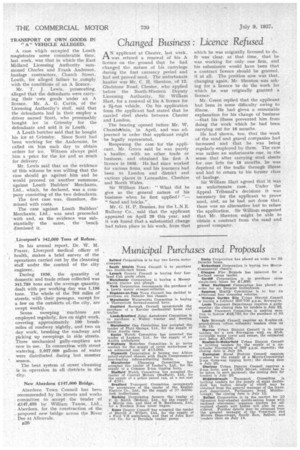Changed Business : Licence Refused
Page 30

If you've noticed an error in this article please click here to report it so we can fix it.
A' applicant at Chester, last week, was refused a renewal of his A licence on the ground that he had
changed the nature of his carryings during the first currency period and had not proved need. The unfortunate haulier was Mr. C. H. Shenton, of 12, Gladstone Road, Chester, who applied before the North-Western Deputy Licensing Authority, Sir William Hart, for a renewal of his A licence for a 2,1-ton vehicle. On his application form the applicant had stated that he carried steel sheets between Chester and London.
The hearing opened before Mr. W. Chambeklain, in April, and was adjourned in order that applicant might be legally represented.
Reopening the case for the applicant, Mr. Green said he was purely a haulier, with no other trade or business, and obtained his first A licence in 1935. He had since worked for various firms, and his journeys had been to London and district and various places in Lancashire, Cheshire and North Wales.
Sir William Hart: " What did he give as the general nature of his business when he first applied? "— "Sand and bricks."
Mr. G. H. P. Beaines, for the L.N.E. Railway Co., said that the applicant appeared on April 20 this year, and it wa's found that a substantial change had taken place in his work, from that which he was originally licensed to do. It was clear, at that time, that he was working for only one firm, and his submission would have been that a contract licence should be granted, if at all. The position now was that, changing again, Mr. Shenton was asking for a licence to do the work for which he was originally granted a licence.
Mr. Green replied that the applicant had been in some difficulty owing to illness. He had given a reasonable explanation for his change of business —that his illness prevented him from doing the work which be had been carrying out for 18 months, He had shown, too, that the work of the sand and gravel companies had increased and that he was being regularly employed by them. The case was rather an unfortunate one, in the sense that after carrying steel sheets for one firin for 18 months, he was deprived of the traffic through illness and had to return to his former class of haulage.
Sir William Hart agreed that it was an unfortunate case. Under the Appeal Tribunal's decisions it was necessary for the applicant to prove need, and, as he had not done that, there was no alternative but to refuse the application. Sir William suggested that Mr. Shenton might be able to obtain a contract from the sand and gravel company.




















































































